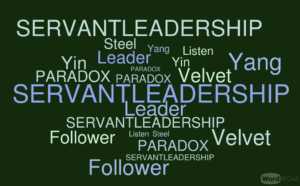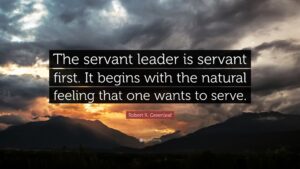
Don’t Retire, Reawaken and Refire
I have a new take to share on retirement. Search online about retirement and much advice will pop up. You’ll find advice about celebration, financial planning, hobbies, exercise, courses, bucket lists, disenchantment, and more. In 2015, Ken Blanchard co-authored the book, Refire! Don’t Retire: Make the Rest of Your Life the Best of Your Life. I agree that many people need to go beyond golf and playing cards at the club. They need to “refire.” I’ve failed at retirement several times, but I finally got it right. Perhaps my experience will be of use to some of you? To “refire”

Why Are We Talking about Ethics?
There I was, giving a guest lecture on leadership at a European business school, when I got an intriguing question from a student in the back of the room: “Excuse me, why are we talking about ethics? This is a course about leadership.“ I came to realize what a gift this question was. His question was so revealing about how we perceive business and leadership today. So revealing about the chasm between how people think about and practice leadership. And so revealing about things we can take for granted and miss if we’re not careful. The question created a teachable

Be Vulnerable: Turn Your Weaknesses into Something Good
Most of us are adept at hiding our weaknesses. I know I am. I’m getting better though. I’ve learned that being vulnerable by admitting my weaknesses often turns the situation around to something good. People Already Know I discovered that many people already knew my weaknesses. It was obvious to them, even while I was working feverishly at hiding and self-deception. I was often the leader of many of these people, but they weren’t really sure if they could talk about my weaknesses to me directly. So, like me, they pretended to me that my flaws weren’t there. We

What Are Your Leadership Derailers?
Here’s the thing: you want to be a better leader. But you’re probably focusing on what to do as a leader while neglecting what not to do. That’s where leadership derailers come in—the things that take you off track and inhibit your leadership effectiveness. If you want to be a good leader, you must be aware of your derailers and begin working on them. “Most books about leadership tell us what a person ought to do to become effective and powerful. Few tell us what to avoid. But the latter may be even more valuable because many people on the

Why Leaders Can’t Be Loners
Early in my business career, I was a loner. I worked hard and was polite to others, but I never connected with colleagues. I never opened up to reveal what I was feeling. It was all business. I kept my head down and “nose to the grindstone.” Since I had done well in college and grad school that way, I just carried it on. I never gave much thought about why I should relate more deeply to other people. That approach was a failure. Leaders can’t be loners. Since I was a loner, all the work I did fell on

Ethical Leadership: Our Gamechanger
(This presentation was given on April 27, 2022, by Bob Vanourek at the University of Denver’s Elevate Ethics 2022 Event, hosted by the Daniels College of Business and the Institute for Enterprise Ethics.) “Elevate Ethics.” What a wonderful title. I want to speak tonight about ethical leadership, my passion. How can we be more ethical in today’s world? Why are ethics important? Whose ethics? And just what are ethics anyway? I hope to encourage all of us to strengthen our ethical foundations. My interest in ethical leadership started in my first job. As young MBAs, we were doing things I

Five Letters You Should Write
In his book, The Five Letters Every Christian Should Write: Reflections on Life, Death, and Spirit in the Age of Covid, a close family friend, Rev. David E. Gray, Senior Pastor of Bradley Hills Presbyterian Church, recommended readers write a letter to their parents, God, a significant person, a future generation, and oneself. With my son Gregg’s encouragement, I wrote those letters over the course of a year to my parents, who died too early in the 1960s; to God; to my dear wife, June; to the next generations; and to myself. I was deeply moved by this and found
Lead by Leading
(Guest article by Bill Thompson.) Leadership occupies the vast space between that which is clearly right and clearly wrong. The result often is indecision and inaction at the highest levels of organizations. This failure of leadership can be catastrophic, and often is. While most are familiar with the high failure rate of businesses during the early years (nearly 80% by the second year), many do not know that established businesses, even those with ten years of operating history still have a greater than one in three chance of failure. Businesses that have operated for 20 years remain at a

How to Become a Better Servant Leader
Decades ago, Robert Greenleaf articulated one of the most important leadership frameworks in history: “servant leadership.” Greenleaf described the essence of this counterintuitive approach here: “The servant leader is servant first. It begins with the natural feeling that one wants to serve. Then conscious choice brings one to aspire to lead. That person is sharply different from one who is leader first, perhaps because of the need to assuage an unusual power drive or to acquire material possessions.” -Robert Greenleaf According to this framework, the only people who can determine if you’re a leader are those who freely and knowingly choose to

Boards and Servant Leadership
Writing a half-century ago, Robert Greenleaf already saw a new and more active role for board members.* In his groundbreaking book, Servant Leadership, Greenleaf had a chapter on “Trustees as Servants.” He wrote: “This chapter is an argument in support of trustees choosing to be servants.” Greenleaf felt organizations (and their boards) were underperforming: “… the best of our institutions is too far below what is reasonable and possible.… The conventional trustee role may be described as a reacting role. In such a reacting role, trustees usually do not initiate or shape the character of the institution, nor do they

Why Maximizing Shareholder Value is Wrong
A big debate has been raging about the purpose of business for decades. Two opposing theories dominate the discussion: shareholder primacy theory and stakeholder theory. How does Robert Greenleaf’s servant leadership framework fit with these models? Shareholder Primacy Theory In 1970, Milton Friedman (a noted conservative economist at the University of Chicago) wrote an influential New York Times Magazine essay, “A Friedman Doctrine: The Social Responsibility of Business Is to Increase Its Profits.” He argued that a company’s only responsibility is to its shareholders who “own the business.” Friedman wrote: “The stockholders or the customers or the employees could

Unleashing Leaders in Your Organization
In his classic essay, “The Servant as Leader,” Robert Greenleaf (creator of the servant leadership framework), wrote the following: “Anyone can lead…. There is a problem of getting used to the idea of no single chief, but the passage of time will allay that.” -Robert Greenleaf This short statement has profound implications. Empowerment Historically, the person at the top of the organizational hierarchy was the boss whose word was virtually absolute. Over time, as management and leadership practices evolved, “empowerment” of others became a trend. “Collaboration” gained prominence. But a boss who collaborates may still be the boss, kindly

The Paradoxes of Servant Leadership
Leadership is rife with paradoxes, seemingly self-contradictory statements that may nonetheless be true. We see this in the servant leadership framework as well as other approaches. The Servant-as-Leader Paradox In his biography of Robert Greenleaf (originator of servant leadership), author Don Frick said: “Servant and leader are two nouns which usually describe two quite different roles. The hyphen holds them together in paradox, creating a Zen-like koan which stops the reader as he or she considers how two such dissimilar words could go together. Greenleaf was fully aware of this effect and wanted the reader to complete the meaning.

Do I Have to Be a Servant Before I Can Lead? (On Servant Leadership)
Robert Greenleaf was clear when he created the servant leadership framework: “ … the great leader is seen as servant first.… the only authority deserving one’s allegiance is that which is freely and knowingly granted by the led to the leader in response to, and in proportion to, the clearly evident servant stature of the leader.” Servant first? Do I have to be a servant first before I can lead? Bob Vanourek first learned about servant leadership when he was in his early thirties and well after he had started his professional career. He now confesses that his goal when he

The Essential Qualities of Servant Leadership
In the years since Robert Greenleaf first published his essay, “The Servant as Leader,” many notable authors and experts have built upon his work. As expected, servant leadership in theory and practice has evolved over time as the context of leading has changed. Here we’ll summarize Greenleaf’s original ideas on servant leadership, recap what some others have added, and then add a few of our own thoughts. Greenleaf’s Qualities of Servant Leadership In “The Servant as Leader,” Greenleaf wrote (the bold italics are ours): “The servant-leader is servant first… Putting people first… That person is sharply different from the
